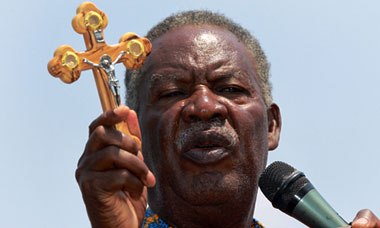LUSAKA, (Reuters) – Zambian President Michael Sata, an abrasive figure nicknamed ‘King Cobra’ because of his venomous tongue, has died in London where he had been receiving medical treatment, the government in Africa’s second-largest copper producer said today.
Sata, whose attacks on foreign mining companies have sometimes rattled investors, died on Tuesday evening at London’s King Edward VII hospital, the Zambia Reports and Zambian Watchdog websites reported. He was 77.
The cause of death was not immediately disclosed but Sata, who became president of the landlocked southern African nation in 2011, had been ill for some time.
“As you are aware the president was receiving medical attention in London,” cabinet secretary Roland Msiska announced on state television. “The head of state passed away on October 28. President Sata’s demise is deeply regretted.”
Sata is likely to be succeeded on an interim basis by Defence Minister Edgar Lungu, who stood in recently as acting president, or by Vice-President Guy Scott, who would become Africa’s first white head of state since South Africa’s FW de Klerk in 1994.
The constitution says a new presidential election must be held within 90 days. Most analysts say Scott is unlikely to run because of citizenship restrictions.
The Zambian kwacha fell 2 percent against the dollar although traders said it was unlikely to suffer any prolonged weakness due to the underlying health of an economy expected to grow by seven percent this year.
“Obviously there will be a sentimental temptation to go long on dollars, but I’m also quite confident the central bank will do everything it can to protect the currency,” one Lusaka-based trader said.
“In terms of the economy, everything should still be on track.”

PLATFORM SWEEPER TO PRESIDENT
Analysts said investors were unlikely to miss Sata’s often confrontational style of leadership.
“President Sata has been a divisive figure for Zambia on the economic front, espousing increasingly authoritarian and ad hoc policy measures against the crucial mining sector in recent years, which has hampered investment,” South African consultancy ETM said.
“The president’s passing could make way for a more reformist administration and help to remove broader policy uncertainties.”
Sata’s varied CV included stints as a policeman, car assembly worker, trade unionist and platform sweeper at London’s Victoria station.
He left Zambia on Oct. 19 for medical treatment, accompanied by his wife and family members.
Lungu, secretary general of Sata’s Patriotic Front party, had to lead celebrations last week to mark the nation’s 50th anniversary of independence from Britain.
Concern over Sata’s health had been mounting since June when he disappeared from the public eye without explanation and was then reported to be receiving medical treatment in Israel.
He missed a scheduled speech at the U.N. General Assembly in September amid reports that he had fallen ill in his New York hotel. A few days before that, he had attended the opening of parliament in Lusaka, joking: “I am not dead.”
It was a typically no-nonsense denial from a politician not known for diplomatic niceties.
“I haven’t bloody lost so don’t waste my time,” he barked at a BBC reporter in 2008 after results showed he had indeed lost an election to his main rival, Rupiah Banda, albeit by the narrowest of margins.
Although he toned down the nationalist, anti-Chinese rhetoric that finally helped him oust Banda in a 2011 election, he would still deliver occasional rants at the foreign mining companies in the Copper Belt, to the concern of investors.
A year ago, he threatened to remove the mining licence of Konkola Copper mines, Zambia’s biggest private employer, because of plans to lay off 1,500 workers. During the row, the firm’s foreign chief executive had his work permit revoked.




